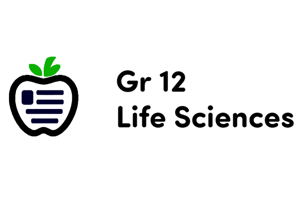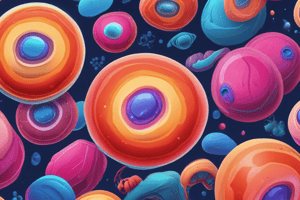Podcast
Questions and Answers
What is the chromosome number in body cells?
What is the chromosome number in body cells?
- 23
- 44
- 46 (correct)
- 22
Where are the germ cells located?
Where are the germ cells located?
- Ovaries and testes (correct)
- Lungs and heart
- Liver and kidneys
- Stomach and intestines
What is the ploidy of gametes?
What is the ploidy of gametes?
- Triploid
- Tetraploid
- Diploid
- Haploid (correct)
What is the function of sex chromosomes in mammals?
What is the function of sex chromosomes in mammals?
What is the role of homologous pairs of chromosomes?
What is the role of homologous pairs of chromosomes?
What is the total number of autosomes in human gametes?
What is the total number of autosomes in human gametes?
During which process do diploid cells undergo two cell divisions that result in haploid cells?
During which process do diploid cells undergo two cell divisions that result in haploid cells?
What type of cells does mitosis produce?
What type of cells does mitosis produce?
In meiosis, what separates during meiosis I?
In meiosis, what separates during meiosis I?
What significant difference exists between meiosis and mitosis?
What significant difference exists between meiosis and mitosis?
What is the primary contribution of sperm to an embryo?
What is the primary contribution of sperm to an embryo?
What is the process of producing gametes known as?
What is the process of producing gametes known as?
Which scientist showed that traits are inherited as discrete units?
Which scientist showed that traits are inherited as discrete units?
'Gametogenesis' primarily differs between females and males in terms of:
'Gametogenesis' primarily differs between females and males in terms of:
'Purebred plants', 'control over breeding', and 'observation of seven 'either-or' traits' were key decisions made by Mendel in his experiments to establish:
'Purebred plants', 'control over breeding', and 'observation of seven 'either-or' traits' were key decisions made by Mendel in his experiments to establish:
During which process do diploid cells undergo two cell divisions that result in haploid cells?
During which process do diploid cells undergo two cell divisions that result in haploid cells?
What is the significant difference between meiosis and mitosis?
What is the significant difference between meiosis and mitosis?
What is the primary contribution of sperm to an embryo?
What is the primary contribution of sperm to an embryo?
What is the chromosome number in body cells?
What is the chromosome number in body cells?
Where does gametogenesis primarily differ between females and males?
Where does gametogenesis primarily differ between females and males?
What is the ploidy of gametes in animals?
What is the ploidy of gametes in animals?
Which type of cells have homologous pairs of chromosomes with the same structure?
Which type of cells have homologous pairs of chromosomes with the same structure?
What process results in haploid cells with one copy of every chromosome?
What process results in haploid cells with one copy of every chromosome?
What type of cells undergo two cell divisions that result in haploid cells?
What type of cells undergo two cell divisions that result in haploid cells?
Flashcards are hidden until you start studying
Study Notes
Chromosome Number and Ploidy
- Body cells have a diploid chromosome number of 46 in humans (23 pairs).
- Gametes (sperm and egg cells) are haploid with a single set of 23 chromosomes.
Germ Cells and Location
- Germ cells are located in the reproductive organs (ovaries in females and testes in males).
Functions and Roles of Chromosomes
- Sex chromosomes in mammals determine biological sex: females have two X chromosomes (XX), and males have one X and one Y chromosome (XY).
- Homologous chromosomes consist of paired chromosomes that share a similar structure and carry genes for the same traits.
Autosomes and Gametes
- Human gametes contain 22 autosomes and 1 sex chromosome (a total of 23 chromosomes).
- The process of meiosis involves diploid cells undergoing two rounds of cell division to produce four haploid cells.
Mitosis vs. Meiosis
- Mitosis results in two identical diploid cells, while meiosis results in four genetically diverse haploid cells.
- During meiosis I, homologous chromosomes separate and move to opposite poles.
Sperm Contribution and Gametogenesis
- The primary contribution of sperm to an embryo includes half of the genetic material and vital cellular components necessary for fertilization.
- The process of gamete production is known as gametogenesis.
Genetic Inheritance and Mendel's Experiments
- Gregor Mendel demonstrated that traits are inherited as discrete units (genes) through his experiments involving purebred plants and careful breeding of seven distinct traits.
- 'Gametogenesis' exhibits differences between females and males, primarily in the number and timing of gamete production.
Summary of Key Processes
- Meiosis is the process in which diploid cells undergo two cell divisions resulting in haploid cells.
- The significant difference between meiosis and mitosis lies in the number of resulting cells and genetic variation; meiosis results in four haploid cells, while mitosis produces two identical cells.
Studying That Suits You
Use AI to generate personalized quizzes and flashcards to suit your learning preferences.




